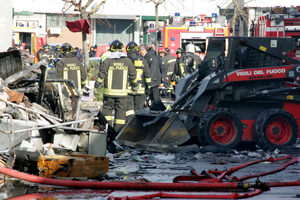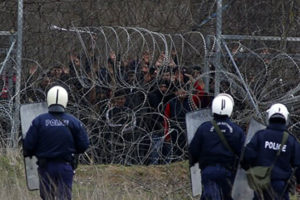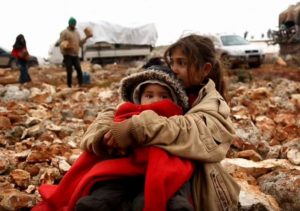Fire Kills at Least 7 in Italian Sweatshop ‘Dormitory’
The tragedy Sunday draws spotlights to the growing problem of sweatshops in Europe exploiting immigrant laborers, just another part of the region's struggle to handle legal and illegal immigration.
At least seven people died and three others were injured Sunday when a fire destroyed a garment factory, including an upper-floor cardboard “dormitory” housing workers, in the Italian town of Prato, Reuters reports.
Beyond the tragedy itself, the fire has drawn a spotlight to a problem most people equate with Bangladesh and other low-wage countries: sweatshops churning out low-cost clothing for Western customers, while exploiting workers in Dickensian fashion.
According to the Reuters report at The Guardian, the dead workers in Prato were living in a cardboard-walled dormitory above the factory in which they worked — part of a growing enclave of illegal factories in Tuscany.
“This is a disgrace for all of us, because we have to recognize this reality for what it is: the biggest concentration of illegal employment in northern and central Italy,” said Enrico Rossi, president of the region of Tuscany.
Footage posted on the website of the local Il Tirreno newspaper showed fire crews battling the flames in a warehouse-like structure while smoke poured out of the building. Ambulances and police vehicles were also on the scene.
The disaster prompted immediate questions about the conditions on the site and in a network of similar workshops operating in the area, which is noted for its large number of Chinese-owned textile manufacturing businesses, many operating on the fringes of legality.
“No one can say they are surprised at this because everyone has known for years that, in the area between Florence and Prato, hundreds if not thousands of people are living and working in conditions of near-slavery,” Roberto Pistonina, secretary general of the Florence and Prato section of the CISL trade union, said on his Facebook page.
The town has 15,000 legally registered Chinese nationals, but officials estimate there are many more working in some 4,000 small factories. Investigators said there was evidence of illegal building adaptations, and of safety violations in the building itself.
Italy has been at the forefront of Europe’s growing struggle with immigration, from economic migrants such as those working in the illicit factories, to the constant flow of refugees in boats from the Middle East — particularly Syria — and northern Africa. And although the crisis is counted in cold statistics, Sunday’s fire — and earlier unrelated disasters at sea — put the issue in human terms.
The disaster underlined the unsafe conditions in which the workers are employed in many of the workshops, although there was no immediate word on what may have started the blaze.
“The worst thing was hearing the cries of the people trapped inside,” said Leonardo Tuci, an off-duty police official who saw the fire and sounded the alarm. “I did what I could, I dragged two people out, I’m only sorry I couldn’t do more.”
“I think the flames caught them in their sleep,” he said.
—Posted by Scott Martelle
.
Your support matters…Independent journalism is under threat and overshadowed by heavily funded mainstream media.
You can help level the playing field. Become a member.
Your tax-deductible contribution keeps us digging beneath the headlines to give you thought-provoking, investigative reporting and analysis that unearths what's really happening- without compromise.
Give today to support our courageous, independent journalists.









You need to be a supporter to comment.
There are currently no responses to this article.
Be the first to respond.